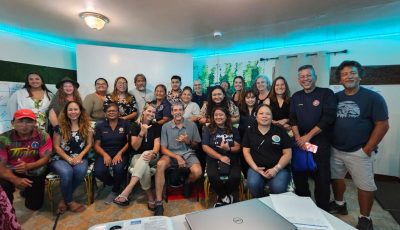CHCC is found in contempt
CUC allowed to stop providing utility services to CHCC’s ‘non-essential’ services
The Commonwealth Healthcare Corp. was found in contempt yesterday for not complying with a court order to pay its monthly bills with the Commonwealth Utilities Corp., now reaching a total of $14.7 million.
As sanction, Superior Court Associate Judge David A. Wiseman allowed CUC to cut utility services to CHCC’s “non-essential” services unless the health corporation pays up or pays in an amount that satisfies CUC.
The judge, however, deferred the execution of the sanctions by 45 days to give CHCC time to file within 10 days from yesterday any objections to the list of “non-essential” hospital services.
Wiseman vacated his orders dated June 2, 2014, and Jan. 20, 2015, that required CHCC to pay CUC its billings. He further ordered CHCC continue to pay its monthly utility bills to CUC.
Wiseman stated that there is no question that CHCC is in a dire financial situation but the court cannot permit anyone who is under a court order to unilaterally disobey that order without facing some consequences.
“Here, the hospital [CHCC] was even aware of what the consequences could entail,” he said.
Among the CHCC services that Wiseman declared “non-essential” were a Commonwealth Health Center well; the Department of Public Health Center at a commercial building in Tanapag; DPH-Public Health and DPH-Community Guidance Center at Bencam commercial building in Garapan; DPH Drugs & Substance Abuse at an As Perdido commercial building; the DPH-Substance Abuse Center; and DPH-Rota Health Center’s café.
Documents filed in court showed that the Rota Health Center café’s utility billings for October, November, and December 2014 totaled $70,191.39 (October: $26,398.41; November, $23,248.26; and December, $20,544.72)
Wiseman found this utility expense for a café on Rota to be exorbitant, saying he is not inclined to find the café an essential CHCC service.
Wiseman relied on the list of non-essential accounts provided by CHCC on March 6, 2015.
CUC’s earlier asked the court to hold CHCC in contempt for allegedly ignoring a $1.3-million bill for utility services for three months in 2014. CUC, through counsel James Sirok, alleged that the non-payment caused CHCC’s total overdue balance to balloon to $14.7 million.
CUC also showed that the hospital did not pay any utility services bills for January 2015.
In its response, the hospital, through assistant attorney general David Lochabay, argued that its non-payments were not willful.
Lochabay asserted that CHCC’s net income, after deducting “critical” expenses, was insufficient to pay CUC any of the monthly bills in question.
In his order yesterday, Wiseman pointed out that CHCC had testified that its combined revenue for October, November, and December 2014 was $6.8 million. In that same period, the hospital paid $5.4 million in personnel costs and had $1.5 million to spend on vendors, including to non-medical and medical supplies vendors.
During those three months, CUC, a non-medical vendor, billed CHCC $1.3 million for utility services provided to the hospital facilities on Saipan, Tinian, and Rota.
CHCC argued that it could not have paid CUC’s monthly bills because choosing to pay CUC over payments to its medical supply vendors or to its employees would have jeopardized hospital operations.
CHCC also asserted that its choice not to pay its CUC bills was based on a belief that CUC, a public entity, would be more understanding about the hospital’s need to pay outstanding debts owed private vendors.
Wiseman said the court is not persuaded by CHCC’s arguments.
“The court is not aware of any case law that provides for the legal principle that the hospital advances; that a party with a court directive to pay a reasonable and necessary business expense has the discretion to prioritize said expenses as if there was no court order,” Wiseman said.
The law, the judge said, does not allow for CHCC to create its own inability to comply with the court orders.
At the Feb. 24 hearing, Wiseman noted that CHCC was “technically bankrupt.” In response, CHCC stated that it was “insolvent.”
Wiseman said CUC lost its independent status as a public corporation in 2006 and was re-incorporated into the Department of Public Works under an executive order.
Wiseman said while CUC was a part of DPW, the Legislature wrote off $45.5 million of the principal amount of CUC’s loan from the Commonwealth Development Authority.
“It is not difficult to see some irony behind the events leading up to [this] matter,” the judge said.
CHCC was initially established as the Department of Public Health and Environmental Services in 1978. In 2009, DPH was re-organized into CHCC, a public corporation, under the Commonwealth Healthcare Corp. Act of 2008.
As one of the goals of the re-organization, the Legislature cited a desire for the hospital to be an “independent public healthcare institution that is as financially self-sufficient and independent of the Commonwealth government as is possible.”
“That wish appears to not have been realized. The hospital is in dire need for more money,” Wiseman said.
Although CUC and CHCC were reorganized several times and now exist as quasi-independent institutions, they are far from being private enterprises, Wiseman said, and are therefore very much public institutions charged with the paramount responsibility of providing essential life necessities to the people of the CNMI.
Such responsibilities, Wiseman said, cannot realistically be satisfied without adequate funding from the government.
Wiseman said the government should consider prioritizing funding when necessary to support the hospital and CUC to assure that they can and do provide the life essential entitlements to its people.
“Perhaps it is time for the Commonwealth government, in general, and specifically, for the Commonwealth Legislature to seriously reconsider the current status of these ‘independent’ agencies—and provide adequate support for their understandably colossal needs,” Wiseman added.



























